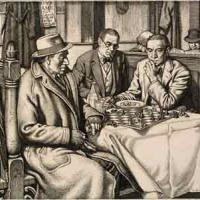
Jewish Chess Masters
 The Chess Players by Moshe Rynecki 1935 |
|
from Jewish Achievement by Mendel Silber
THE study of Talmudic subtlety and Rabbinic sophistry has not been without wholesome effect, at least in one direction. It has constantly sharpened the intellect of the Jew and has endowed him with those qualities that make for excellence in chess-playing. For in this game, the most dignified diversion mankind has ever invented, the Jew has for a long time excelled and stands today as the world's champion. As early as the ninth century Jews were already known to be fond of this game, and throughout the Middle Ages it formed their most favorite pastime and recreation. The most rigid rabbis recommended it, the most unworldly moralists sanctioned it, and the most learned men indulged in it. Pope and prince, fond of chess, often showed leniency to the Jew because of his masterful playing. Even with the gentler sex among the medieval Jews the game was not an uncommon occupation, as is evident from the fact that in beginning of the seventeenth century a Jewess of Venice was universally acknowledged queen in the art of chess-playing. And the Jew has not alone played and practiced the game, but he has also taught others to play and practice it. He has written works on it which were often translated into other languages and served as guides and manuals in the rules of the game. The oldest set of chess rules extant is that of Abraham ibn Ezra, of the twelfth century. Among the numerous other works, those of Moses Azan of the thirteenth century, Bonsenior of the fifteenth, Leo di Modena of the sixteenth, and Jacob Eichenbaum of the eighteenth centuries are equally well known and often quoted. From the eighteenth century on, from the time of the Rabbi Aron Alexandre and Elder von Ankerberg, Jews have uninterruptedly been the undisputed masters of chess. Wilhelm Steinitz, whose pathetic death in New York ten years ago was mourned here and abroad, had held the world's championship for three decades and was universally recognized as the greatest genius among chess-players of the nineteenth century. His only real rival was another Jew, Hermann Zuckertort, who excelled all others as a blindfolded player. These two masters have in turn been succeeded in the world's championship by a Jew, Emanuel Lasker. Certainly not a bad record for a people that has had but little leisure for play. Yet every country has had its Jewish champion. Siegbert Tarrasch, Richard Mangelsdorf, Oscar Blumenthal, David Harrwitz, Carl Schlechter, Bernays and Cohn, in Germany; Samuel Rosenthal (of Russian birth), Leopold Hoffer, and S. Alapin, in France; Berthold English and Schwartz, in Austria; Ignatz Kolisch, Isidor Gunsberg and Max Weiss, in Hungary; B. Horwitz, L. Hoffer (latterly), H. Jacobs and J. J. Loewenthal, in England; Simon Winawer, David Janowski, Schiffers, Lipke and Eisenberg, in Russia; and Solomon Lipschuetz and E. Delmar, of American players, are all names whose fame has time and again spread beyond the borders of their respective countries and roused the emulation of amateurs, the envy of professionals, and the admiration of all persons interested and instructed in the game of chess. What the achievements of the Jew might have been in this, as in every other branch of play or work, if he were allowed to live his own life and develop undisturbed the best that is in him, can, of course, only be conjectured. But it does seem as though he possessed certain peculiar but praiseworthy traits, whether hereditary or acquired, whether they be the result of his religious training or characteristics of the race, whether they have come about through his mental labors or his moral life, at any rate his distinctive traits are undeniably there. And one cannot help wishing that these traits become known both to himself and others. By this a double purpose could be served. It would stand as an offset to his less laudable traits, for such, too, the Jew has (Heaven knows, the Jew has never posed as a saint or an angel!) ; and it would help him to perpetuate consciously what he has inherited or acquired unconsciously. Nay, more, one cannot but hope for the day when all the nations of the earth shall recognize his worth and encourage his work, so that he and all mankind may enjoy the fruits of the manifold Jewish achievements. THE END |
